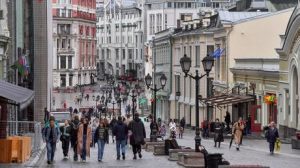
Real World Economics: Will our creative intellect work to destroy us?
Edward Lotterman
“Capitalism is a process of creative destruction,” according to Austrian-American economist Joseph Schumpeter.
Yet “capitalism” is such a loaded term, along with “socialism,” that I avoid using it. So think “mixed-market economies” instead.
Usually, the benefits from creation outweigh the losses from destruction, but not always.
The benefits? The internet and social media, broadly defined, have vastly facilitated many things, including one’s ability to be an academic or pundit. For one grad course paper on sheep production in 1978, I logged 71 hours punching historic data into paper cards. Now I download that same data from a USDA site in less than 30 seconds.
And 20 years ago, an editor questioned whether a quip I used was from Dorothy Parker or Anita Loos. “Let me ask a colleague,” Casey told me. “She uses something called Google to look things up.”
“Something called Google.”
In the years since, work — and life — would never be the same.
The losses? Narrowly, my email inbox folder with 63 scam messages received over five days; more broadly: the society of internet trolls who have warped the meaning of truth for many people while also working to foment ignorance, real violence, and destroy the lives of people they disagree with.
This form of creative destruction is now new. Examples go back through history. The development of ships that could carry Portuguese explorers around Africa to spice-producing Asia changed cuisine all across Europe — a true benefit. But it came at the cost of, narrowly, ruining the overland camel train business; and broadly, creating huge financial incentives for European nations to colonize vast areas of the globe, creating a “forced market” economic system that enslaved people and extracted wealth for over 400 years.
Similar ships carried Columbus and others across the Atlantic, bringing back potatoes, tomatoes — and gold — but delivering measles, smallpox and other maladies that would kill tens of millions of the native peoples in a few decades.
Water-powered, factory produced spinning and weaving dramatically lowered the cost of clothing, but cast thousands of work-from-home spinners and weavers into poverty. Steam engines permitted mills to be built anywhere, spreading the economic bounty of manufacturing, but scourging the prosperous riverside cities and towns that had flourished on streams suitable for water wheels.
Reduced costs of transforming fleece into coats redistributed the returns from estates rented to small crop growers to hiring a few shepherds to tend vast flocks. The result? Millions of acres were “enclosed” and “clearances” moved millions of people out of ancestral villages. Yet less than a century later, wool from vast grazing areas in Australia and Argentina would bankrupt these European estates.
Exporting beef salted into barrels for shipment to London was a good business along the River Plate in Argentina and Uruguay. It sold moderately well in London, Liverpool and other importing nations but posed little threat to locally raised cattle. Mechanical refrigeration plants for ships changed that equation. It still took three weeks for a steamer to make the run north, but sides of beef hanging in a 34-degree hold kept well enough that Europe cattle raising was poleaxed.
Similarly, the Keith brothers building short railroads in Central America saw refrigerated ships could move bananas north across the Gulf of Mexico and onto iced railroad cars reaching places even more distant than Minnesota. The economy — and the politics — of Central America were profoundly transformed in ways that painfully still are being worked out.
While in North America, the simultaneous expansion of European peoples’ occupation of flatlands west of the Mississippi with the invention of Cyrus McCormick’s reaper and steam-powered threshing machines undercut farming all over Europe. Small farmers all across Europe still harvesting small plots with scythes headed for the factories of Ruhr or Manchester or the iron mines of Belgium. Day laborers on once profitable estates in southeast Sweden or on sandy German and Polish Baltic shores faced starvation. Ships took them to “the new land” of Kansas, Minnesota or North Dakota. Finns, Slavs and myriad other European peoples began treks to mines and mills in the Ohio River Valley and points west, and left their marks culturally as well.
Now consider the impacts on knowledge, politics and business. The invention of moveable type by Johannes Gutenberg in the 1480s was more world-changing than Tim Berners-Lee inventing hypertext markup language in the 1980s. The Reformation and the establishment of modern republics in places like Geneva and Amsterdam as alternatives to monarchy could not have taken place without it.
Double-entry accounting, insurance, stocks, bonds, futures contracts and options all were being invented in northern Italy and the Low Countries. The VOC, aka Dutch East India Co., the first true modern tradeable-joint-stock corporation, came along 120 years after Gutenberg. Martin Luther nailed his theses to the church door in 1517. Geneva became a republic in 1535, the same year Francisco Pizarro seized the west coast of South America from the Incas. French lawyer-theologian John Calvin started writing from Geneva six years later.
These were physical production technologies changing societies and cultures as well as economies. Creating and destroying. They simultaneously opened up some opportunities and incentives and closed others in producing goods and services. But at the same time, technological change was transforming worlds of the mind.
Eighty years later, a small band of Calvin’s followers landed in Massachusetts. That was more than a century after a geographically lost Pedro Álvares Cabral had landed in Brazil with 1,200 armed single men bent on capture and extraction, but the Pilgrims fleeing England were families seeking to settle a new land replicating Europe. They had spent some time in the Netherlands, an island of tolerance and freedom in a sea of monarchies. That there were more than 500 printing presses in Amsterdam and no censorship when Louis XIV ruled from Versailles drew dissidents there from the whole continent and shaped the turbulent decades ahead.
But what does all that have to do with my inbox filling up with offers to inspect my roof or “shocking” warnings — with evidence! — that Joe Biden and the Federal Reserve are going to gobble up everyone’s paper money before Thanksgiving and abolish the U.S. dollar in favor of a new global cryptocash?
The answer is that the internet has shaken up mass communications and its implications to the greatest extent since Gutenberg. Information is cheaply available. And one person, especially if sponsored by KGB successors and using bots and AI as multipliers, can try scamming millions in minutes instead of printed handbills on London or Paris streets scamming a few dozen a week.
The old media filters like “Colonel” Robert R. McCormick owning the Chicago Tribune or “Uncle Walter” Cronkite on CBS News telling us the way it is are gone. Any financial scammer, ideological crackpot or cynical politician — ah, but I repeat myself — can reach millions, many of whom have no reference point to separate gold productive information from dross evil propaganda.
Yes, working productivity, knowledge and trade is growing via the internet, simultaneous with threats to our financial system and our democracy that are greater than in centuries, and quite possibly could bring it all crashing down.
I have faith in humans and their ingenuity. I have faith in our goodness. In objectivity. I’m not so cynical to think the evil we harbor will prevail. But I pray that the institutions we rely on will adapt to counter the very real perils we face — that are evident every time we sit down at our computers or turn on the news. But we are on a rocky road.
St. Paul economist and writer Edward Lotterman can be reached at stpaul@edlotterman.com.

